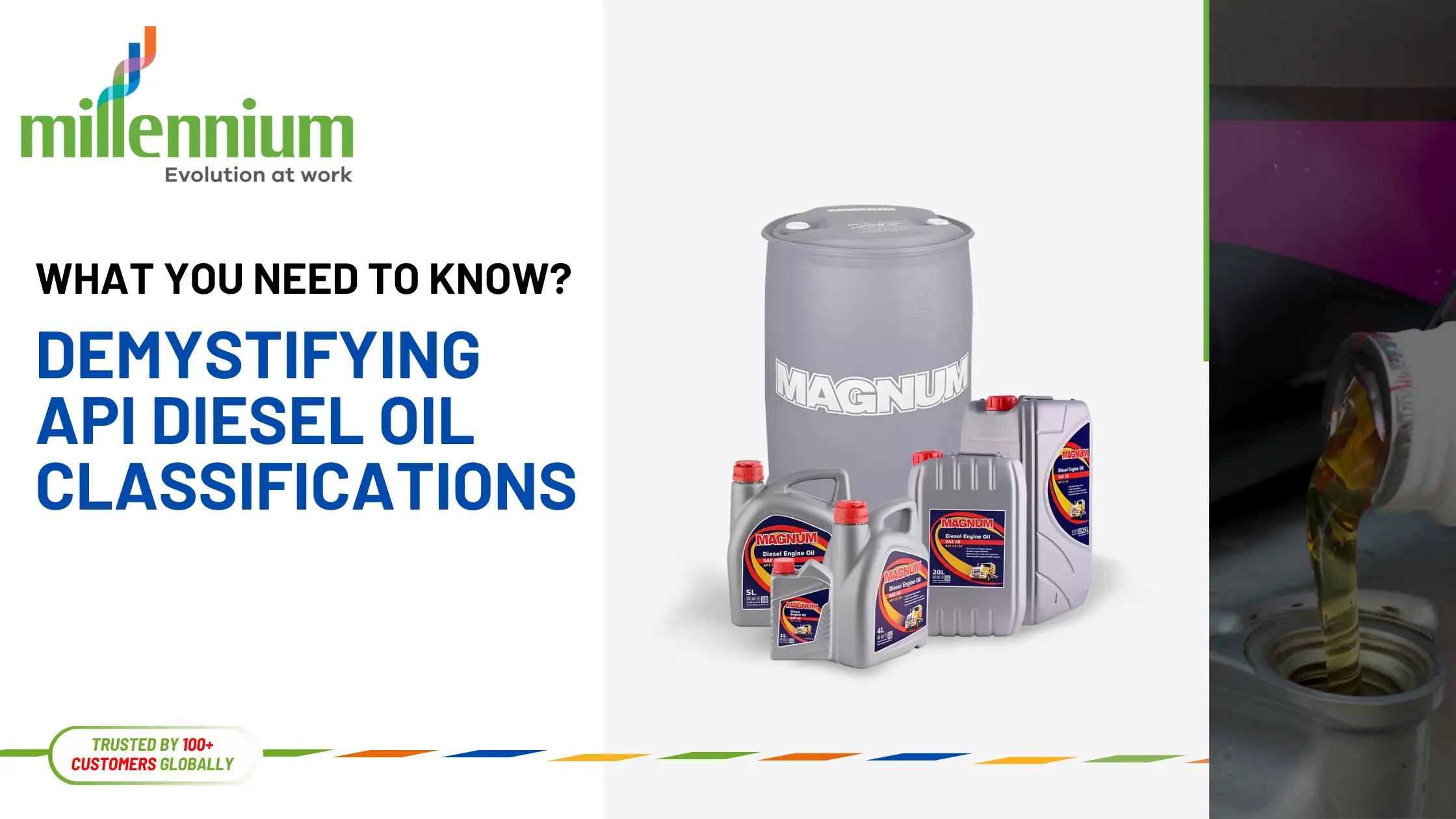Understanding API diesel oil classifications is necessary for anyone working with diesel engines, whether the operator or the machine owner. These classifications are established by the American Petroleum Institute (API) and serve as a reference for selecting the most suitable diesel engine oil for specific engine types.
In this guide, we will delve into the details of API diesel oil classifications, understanding the key factors that differentiate oils like API CK-4, API FA-4, and others. By differentiating between these classifications, we will provide valuable insights into optimizing engine performance and ensuring long-term reliability by choosing the right diesel engine oil.
Understanding API Diesel Oil Classifications
The American Petroleum Institute or API standardizes diesel engine oils through its API diesel oil classifications. These classifications categorize diesel oils based on their properties and performance levels, helping users identify the most suitable oil for their engines. The API classifications, such as API CK-4, API FA-4, or even older designations like API CJ-4, signify the oil’s viscosity and its ability to meet specific engine requirements.
As you may already know, different diesel engines have varying tolerances, ranging from heavy-duty commercial vehicles to modern high-efficiency engines. API classifications provide a clearer reference for selecting oils that meet these diverse needs. It also takes into account factors such as engine design, fuel efficiency, emission standards, etc.
API Classification System
The API classification system is a dedicated system based on API diesel oil classifications so that engine oil can be easily categorized based on its performance characteristics. This system provides valuable guidance to users, helping them choose the right API diesel oil classifications that align with their engine’s requirements and operating conditions.
The API classification system includes various categories, each denoted by a unique alphanumeric code such as API CK-4, API CJ-4, API FA-4, etc.
API CK-4
This category represents diesel oils designed for heavy-duty diesel engines, including those equipped with exhaust gas recirculation systems and diesel particulate filters. API CK-4 oils offer enhanced wear protection, improved shear stability, and excellent oxidation resistance, ensuring reliable engine performance and longevity.
API CJ-4
CJ-4 oils are formulated for older-generation diesel engines but offer robust protection against wear, deposits, and viscosity breakdown. These oils are compatible with engines using low-sulfur diesel fuel and are suitable for applications where emission control technologies like DPFs are not present.
API FA-4
API FA-4 represents a newer generation of diesel oils designed to meet the stringent fuel efficiency and emissions standards of modern engines. API FA-4 oils provide improved fuel economy benefits while maintaining excellent lubrication properties. They are recommended for engines that specifically require FA-4 oils to achieve optimal performance and compliance with emissions regulations.
Other API classifications
In addition to CK-4, CJ-4, and FA-4, the API classification system includes older designations such as CI-4, CI-4 Plus, CH-4, and others. These classifications reflect advancements in oil formulation and performance standards over time, with each category addressing specific engine technologies and industry requirements.
Factors to Consider When Choosing API Diesel Oil
When selecting diesel oil for your vehicle according to API diesel oil classifications, several crucial factors must be considered to ensure optimal engine performance. Here are key factors to keep in mind when choosing API diesel oil classifications.
API Diesel Oil Classifications: Begin by understanding the API classifications such as CK-4, CJ-4, FA-4, etc. Each classification signifies different performance levels and properties suited for specific engine types and operating conditions.
Viscosity Grade: Pay attention to the viscosity grade recommended for your engine. Viscosity impacts oil flow and lubrication under different temperatures and operating conditions.
Engine Specifications: Always consider your engine’s specifications, including its design, fuel system, emission control devices (e.g., DPF, EGR), and performance requirements.
Operating Conditions: Evaluate the operating conditions your vehicle will encounter regularly, such as temperature extremes, heavy loads, stop-and-go driving, or prolonged idling.
Manufacturer Recommendations: Most importantly, you need to follow the manufacturer’s recommendations regarding API diesel oil classifications and viscosity grades while choosing an oil. Manufacturers often conduct extensive testing to determine the best oils for their engines, taking into account performance, durability, and warranty considerations.
Benefits of Using API-Certified Diesel Oil
The main reason behind adhering to the API diesel oil classifications is the benefits that not only simplify the selection process but also ensure you are getting the best engine performance. Utilizing an API-certified diesel oil offers several advantages that contribute to the improved engines such as:
Engine Protection: API-certified diesel oils are ensured to have undergone rigorous testing processes to ensure they exceed industry standards for lubrication performance. By using API-certified oils, you provide your engine with the essential lubrication it needs to reduce friction, minimize wear on engine components, and maintain optimal operating temperatures, ultimately extending engine life.
Compatibility: API-certified diesel oils are designed to be compatible with a wide range of diesel engines, including those equipped with advanced technologies such as exhaust gas recirculation (EGR), diesel particulate filters (DPF), and selective catalytic reduction (SCR) systems.
Performance Optimization: Different API diesel oil classifications are formulated to address specific engine requirements and operating conditions. By selecting the appropriate API-certified oil for your engine, you can optimize performance parameters such as fuel efficiency, power output, and overall engine responsiveness, resulting in smoother operation and enhanced drivability.
Fuel Economy: API-certified diesel oils, especially those in the API FA-4 category, are engineered to improve fuel economy by reducing internal friction and enhancing engine efficiency.
Frequently Asked Questions
What does API stand for in API diesel oil classifications?
How do I know which API classification suits my diesel engine?
What are the differences between API CK 4 and API CJ 4 classifications?
Can I use diesel oil with an older API classification in a newer vehicle?
Are there any specific maintenance tips related to API diesel oil usage?
Conclusion
Understanding API diesel oil classifications is necessary for vehicle maintenance as it enables users to select the most suitable oil for their engines. This choice is based on performance, compatibility, and operational requirements. By delving into API classifications, you can easily optimize engine performance and enhance fuel efficiency. Adhering to API standards not only simplifies the selection process but also guarantees that engines receive the necessary lubrication and protection for an extended lifespan.



